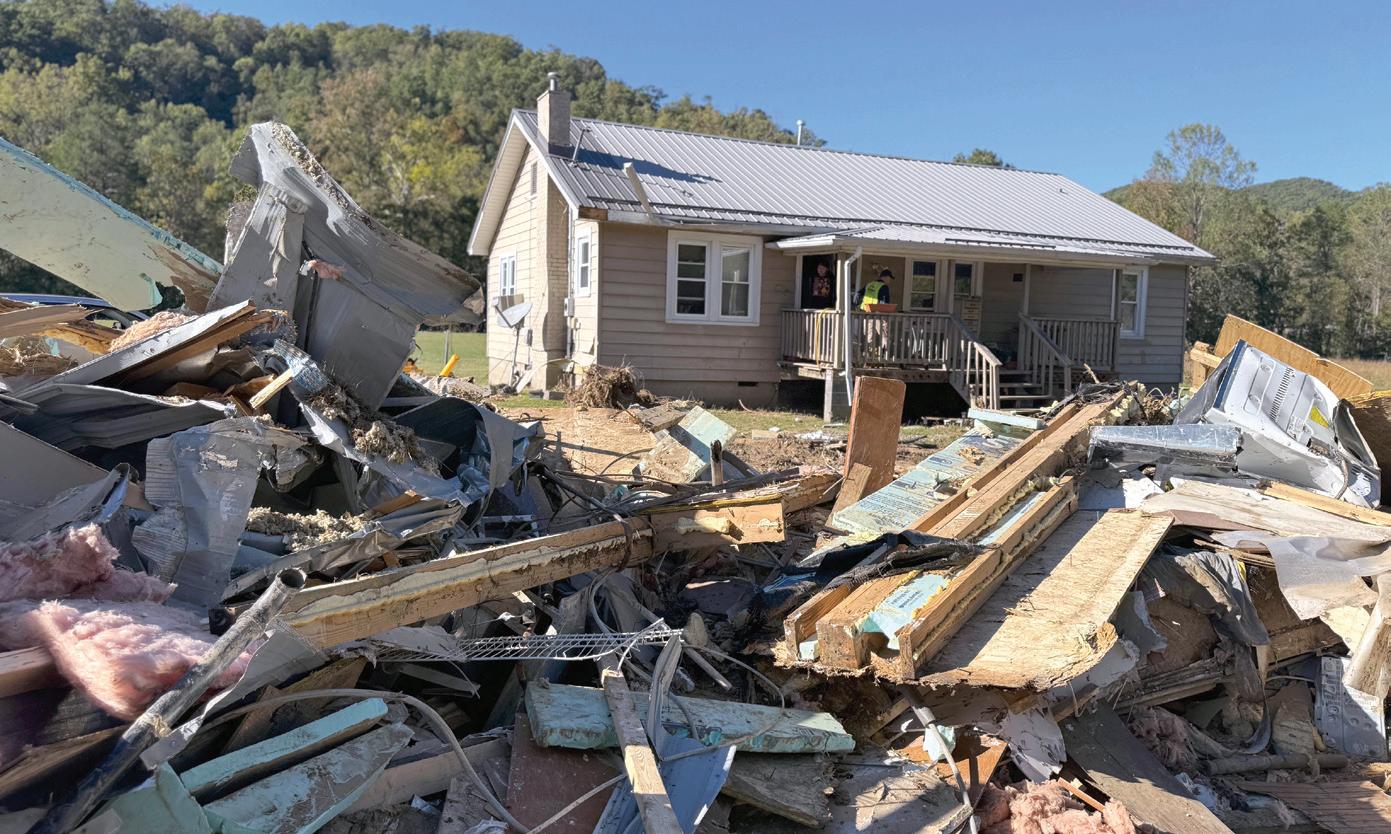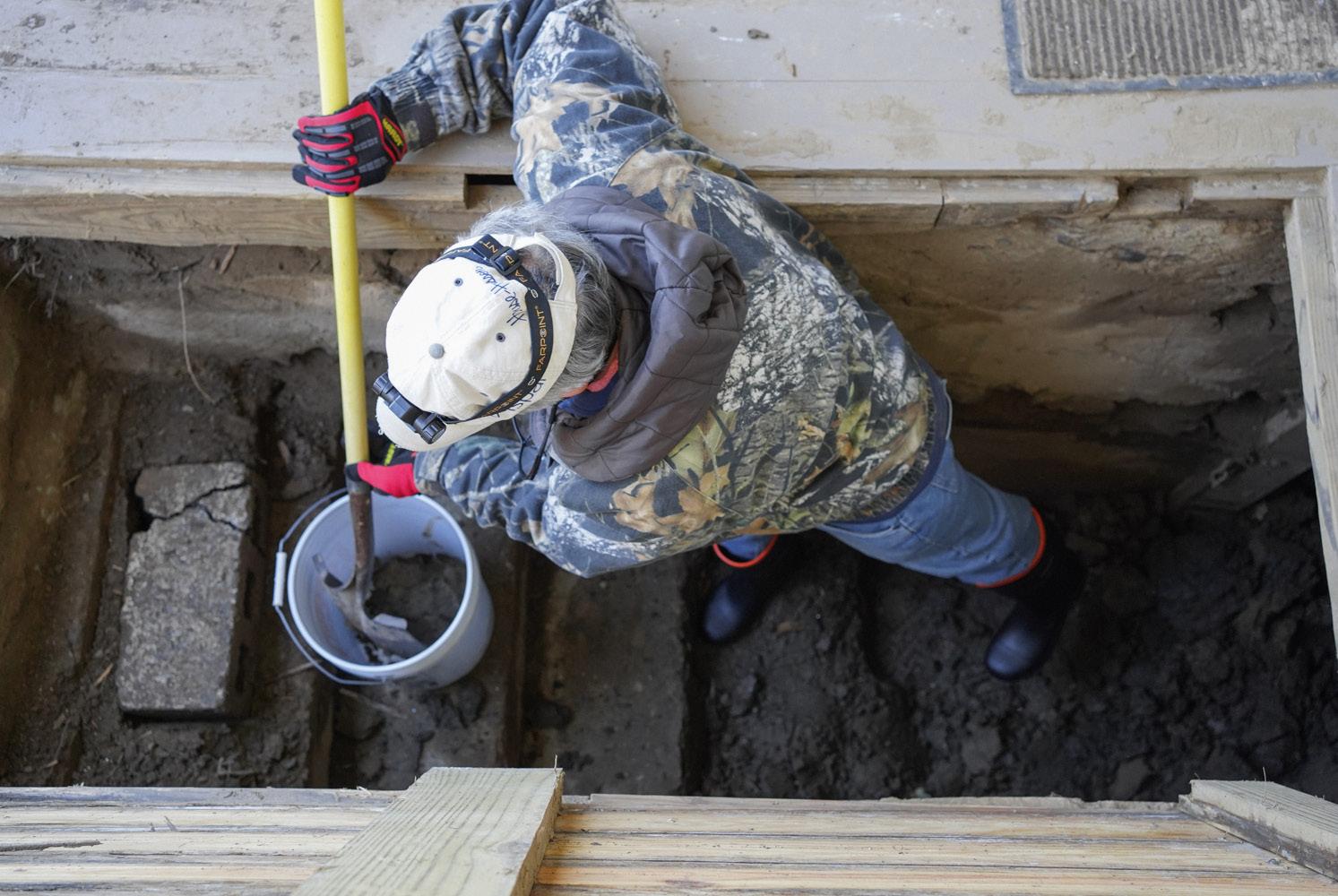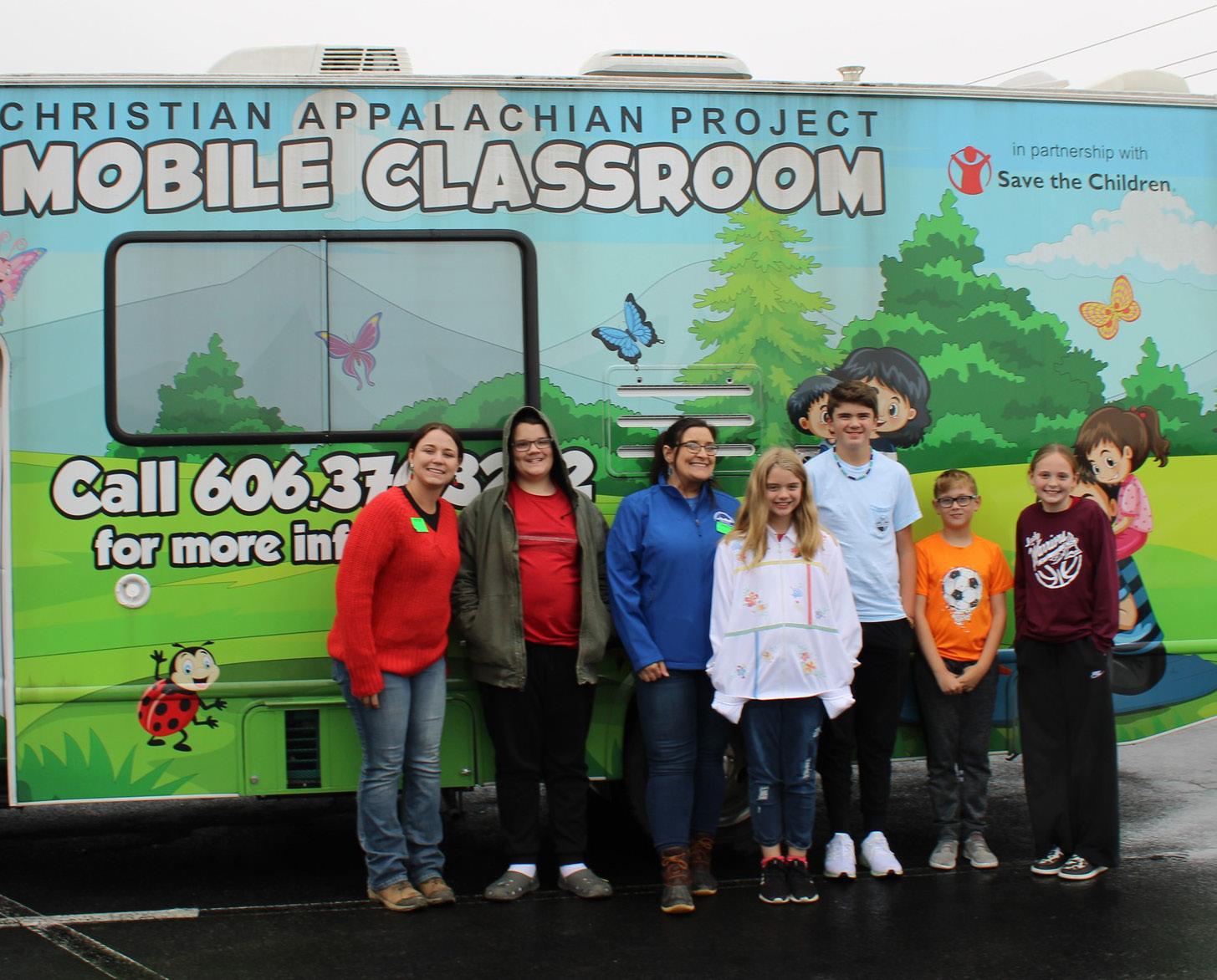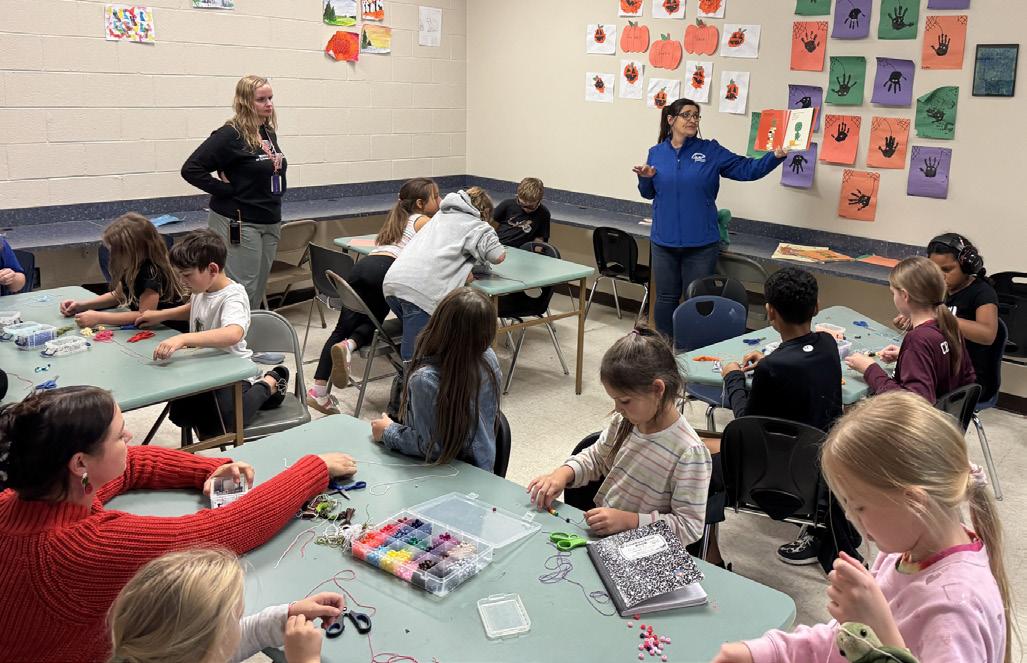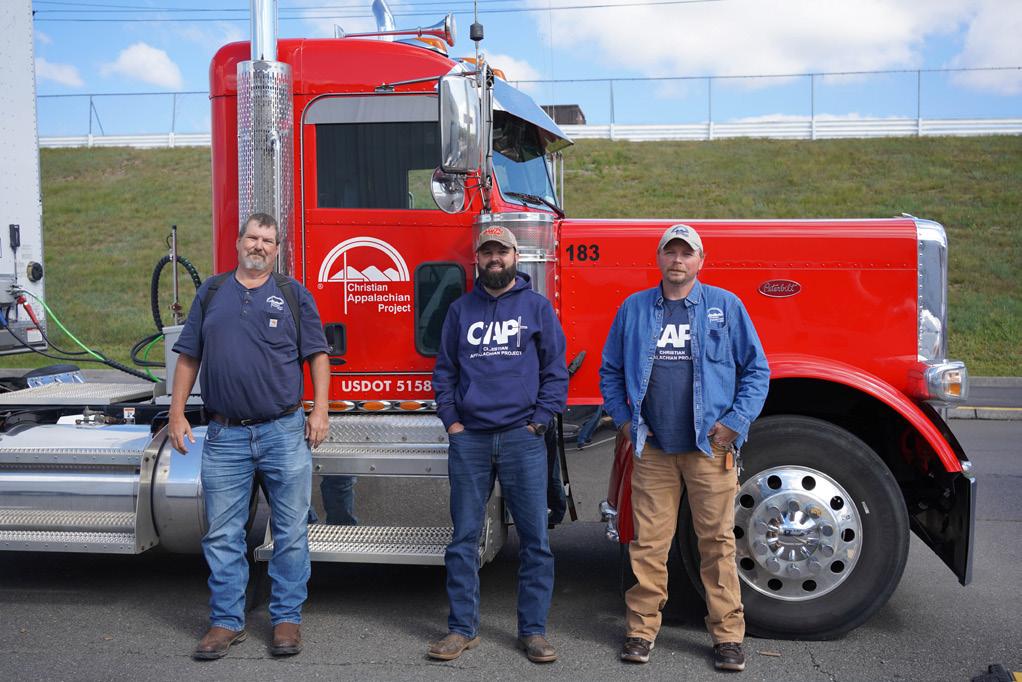
5 minute read
Overcoming Tragedy
BY BRIANNA STEPHENS
Hurricane Helene wasn’t what anyone expected it to be. After the storm’s devastating impact in the Southeast, employees and volunteers from Christian Appalachian Project (CAP) programs came together to help with relief efforts through hands-on work, compassionate services for youth, and donation facilitation to disaster areas.
“I am grateful that when families are hurting following a disaster, CAP staff from a variety of programs come together to help those families get back on their feet,” said Robyn Renner, director of CAP’s Disaster Relief program.
Disaster Relief
CAP’s Disaster Relief program was on the ground in East Tennessee for four weeks, assessing damage, removing downed trees and limbs, and mucking out homes and treating them with mold remediation solution. Sixtysix employees and volunteers served for 4,430 hours. Forty-six homes were assessed, and 24 homes were mucked out and cleaned.
CAP was there to help people like Gary Cloyd. He lost everything in the flood, including his brother. Water from the Nolichucky River filled the basement of Cloyd's home and rose 5 feet into his living spaces. The force of the water was so great, it picked up his 40-by-70-foot detached garage and wrapped it around the side of his house. He was told that possibly saved his single-story home from being completely overtaken by water. His neighbor’s home was condemned after the floodwater rose to the second floor.
“I was lucky that was not my case,” Cloyd said. “It would be much easier to build something new here, but I’m not allowed to do it. I have one option. Either make my home livable again — which [is difficult because] I’ve lost everything — or walk away and lose my land. I’ve either got to start over with the frame or start my life over again at 67 somewhere else.”
In the wake of the flood, CAP helped Cloyd remove the standing water, mud, and debris that filled his basement. In his community, Cloyd is used to helping others, but he is grateful for the help and support he has received.
“It’s hard to explain ‘thank you,’” Cloyd said. “If somebody gives you a bottle of water, you say ‘thank you.’ But how do you say ‘thank you’ now? This is beyond that. There should be a different word made up for something like this. God bless you all.”
While CAP’s employees and volunteers returned from East Tennessee, Renner continues to collaborate with agencies on ongoing recovery efforts.
“We were there to listen to the families and to give them hope. Hope that they will overcome this tragedy and hope that this too shall pass,” Renner said. “When you have never experienced the depth of such a tragedy, you don’t know where to start. I am grateful we were able to share what we know and how to start a long-term recovery process. We will continue to keep in touch to help answer questions when needed.”
Mobile Classroom
CAP’s mobile classroom deployed to East Tennessee to be a light to children and their families in a time of disaster. Lori Ross, CAP’s Infant/Toddler caseworker, and Julie Higginbotham, Eagle Community Center youth and family coordinator, drove the mobile classroom to shelters, community centers, and multiagency resource centers to offer games, books, and activities to children.
Higginbotham remembers a 4-year-old girl in a princess dress gray with dried mud and rain boots who came to the mobile classroom. She picked out a book for Ross to read to her. It was a silly book, but it incited giggles from children and adults alike.
“The laughs were heartwarming and seemed as though, for some of the parents circled around, it was the first laugh they’d had in more than two weeks. People would walk up to us, almost glassy eyed, and you could tell they were so tired,” Higginbotham said. “Just that chance to relax and see their kids smile — I hope it gave them the light and peace of mind they needed.”
Another girl looked forward to reading a book with Ross, but her mom said it was time to go. “Just one more book, Mom! She has my favorite book ever, and the water killed mine,” she said. The mom teared up. Ross handed the book to the girl and told her to take it with her since she lost hers. In that moment, she was so happy, and the mother’s face brightened with hope.
Operation Sharing tractor trailer drivers Wesley Howard, Jon Preston, and Michael Abrams drove truckloads of essential items, like cleaning supplies, food items, and drinks, to Bristol Motor Speedway, which served as the Northeast Tennessee Disaster Relief Center.
Operation Sharing
Since the immediate impact of Hurricane Helene in Appalachian communities, CAP’s Operation Sharing program has managed donations from across the country to ensure relief supplies reach the impacted areas as quickly as possible. CAP’s Operation Sharing program locations in Kentucky have sent more than 40 tractor-trailer loads of essential items worth around $3.5 million to communities in Western North Carolina and East Tennessee. Operation Sharing will continue to send additional truckloads as long as essential items are needed to help families get back on their feet.
“We know there are people hurting right now. We are trying to do everything we can to help them,” said Aaron Thoms, manager of CAP’s Operation Sharing program in Paintsville. “We stand with our brothers and sisters today in prayer and will stand beside them in relief. CAP is there for the long haul.”
